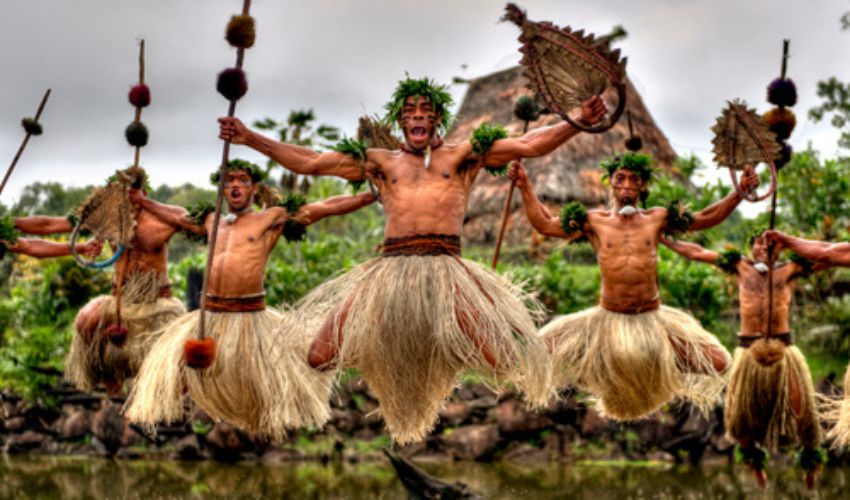Every country has its own different religious people with their own unique cultures and traditions. This value shows the richness of the cultural heritage of a specific religion.
Fiji, an island in the South Pacific Ocean, is mainly known for its picturesque beauty but also has a rich cultural heritage with a deeply rooted community, hospitality, and respect. Fijian cultural practices are brought in by indigenous Fijians and other immigrants from various countries.
One of the Fijian values that holds significance of its culture in Fijian society is Vanua. Vanua is the strong connection between Fijian people and their ancestral land, and it is their collective responsibility to preserve and protect the land.
Likewise, several Fijian cultural attractions are there, holding the strong values of Fijian culture, which are worth exploring.
Here are some unique Cultural Activities in Fiji:
1. The Kava Ceremony:
This ceremony is widely popular in Fijian culture and has unique significance. This traditional drink is made from the roots of the yaqona plant. The ceremony includes two steps: the preparation and consumption of drinks. The roots of yaqona and water are mixed, crushed, and pondered to prepare this drink. Kava is served in a tanoa, which is a large traditional wooden bowl, and the chief of the community initiates the ceremony. The kava ceremony represents friendship, unity, and respect among the participants of the ceremony. Visitors and tourists are often welcomed by the local community to join them in this ceremony.
Kava is a crop of specifically Pacific Islands and is an herbal remedy useful for the treatment of anxiety, insomnia, and related nervous disorders. Thus, one of the properties this ceremony has is medicinal. On the other hand, there is a ceremonial significance to this ceremony, namely that this drink helps people connect with the spiritual world. Fijian people believe that this ceremony is for seeking blessings, and so this ceremony is accompanied by traditional songs and chants.
2. Meke Performance:
Meke performance is a combination of Fijian traditional music and dance performance. They also do storytelling in this performance; the story and theme of this performance are deeply about Fijian history and mythology and are about bravery, love, and cultural heritage. Graceful movements of dancers with drum rhythms, traditional instruments, and melodious singing in the background make the whole performance spectacular.
Local people, dressed in traditional attire and accessories, portray different and unique characters through their storytelling and dance performances. The vibrancy and vitality of Fiji’s culture can be witnessed through this energetic form of performance. The Meke performance is generally performed during cultural festivals or special occasions like tourism events, so visitors too can experience Fijian traditions.
3. Firewalking:
Firewalking is the ritual performed by Fijian locals, which is also known as ‘vilavilairevo’. This ritual is a process of walking barefoot on the burning stone bed without getting any burns. Firewalking is also performed by Fijian local people, who have unique skills and abilities passed down from their ancestors. They believe that this cultural ritual is meant to build strong courage, increase strength, and gain spiritual power. Visitors and tourists can witness this marvellous and captivating performance with mental and physical discipline.
The firewalkers first have to give demonstration of their ability of withstanding the extreme heat of the burning stones. Fijians believe this ritual is for protection, cleansing, and to build strong spiritual connections. This ritual is performed during significant cultural events and festive occasions.
4. Tabua Exchange:
Tabua is nothing but the teeth of whales, which hold ceremonial and cultural significance in Fiji. Exchanging or giving tabua represents gratitude, goodwill, and respect. People in Fiji exchange tabua as a gift to someone, which they think is an important part of Fijian traditional ceremonies such as community events, festivals, weddings, and funerals. Giving tabua as a present to someone represents friendship, trust, and the strengthening of relationships between families, clans, and different communities.
This tabua exchange is one of the sacred ceremonies of Fiji, as they are collected from the teeth of male whales, which are so rare to find. They are special because of their rarity and also have spiritual significance. Visitors are also warmly welcomed by locals to be a part of the tabua exchange custom.
5. Yaqona Circles:
Yaqona circle, also known as kava, is an informal gathering of family, friends, and community in Fiji. Yaqona circles play a vital and central role in social gatherings in Fiji. In this informal gathering, people come together, drink kava drinks, and engage in conversations.
These circles are meant for relaxation, storytelling, discussion, and laughter. Organising a yaqona circle gives a chance to visitors and tourists a chance to interact with locals, share their stories, and get to know Fijian hospitality.
Yaqona circle is not just all about kava; it also provides a platform for discussion of important matters, sharing stories and incidents, and seeking advice. This circle gives a chance for laughter, bonding, and open dialogue. Visitors and tourists can join this tradition and get an experience of Fijian culture.
Exploring Fijian villages and small towns gives you the opportunity to experience a glimpse of Fijian traditions, culture, rituals, and sustainable ceremonies. Visitors are welcomed and invited by locals to join their various activities, such as weaving mats, cooking meals, and communal work projects. These experiences allow visitors to gain knowledge of Fijian culture and appreciate the interconnectedness and simplicity of Fijian village life.
FAQs
There are plenty of cultural practices in Fiji, including traditional music, dances, and storytelling. Yet most popular are Meke performances, the Yaqona ceremony, which is the Kava ceremony, firewalking, and tabua exchange.
Diwali, Christmas, Easter, and hibiscus festivals are some of the examples of festivals celebrated in Fiji throughout the year. The Bula Festival is also widely popular among the cultural festivals of Fiji. There is Fiji Day on October 10th as well, which is celebrated by locals.
It is helpful to already know about the customs of Fiji when visiting it, like saying ‘Bula’ when meeting someone, which is a traditional way of greeting. Modest dressing style, removing shoes when entering someone’s home, and accepting kava culture are a few more customs you should be aware of so you can easily immerse yourself in Fijian culture.
Traditional wears of Fijians are Bula shirt, Sulu, and Bula dress, which are worn by Fijians on special occasions and festivals. If you’re planning to visit Fiji, you must try these beautiful attires.
Fijian cuisine is mainly the combination of Indian, Malaysian, and Polynesian food. It includes Kokodo, made of fish and coconut milk, Lovo made from fish and root vegetables, Rourou made from taro leaves, and Roti and Curry. At last the Cassava cake, a traditional Fijian dessert.








